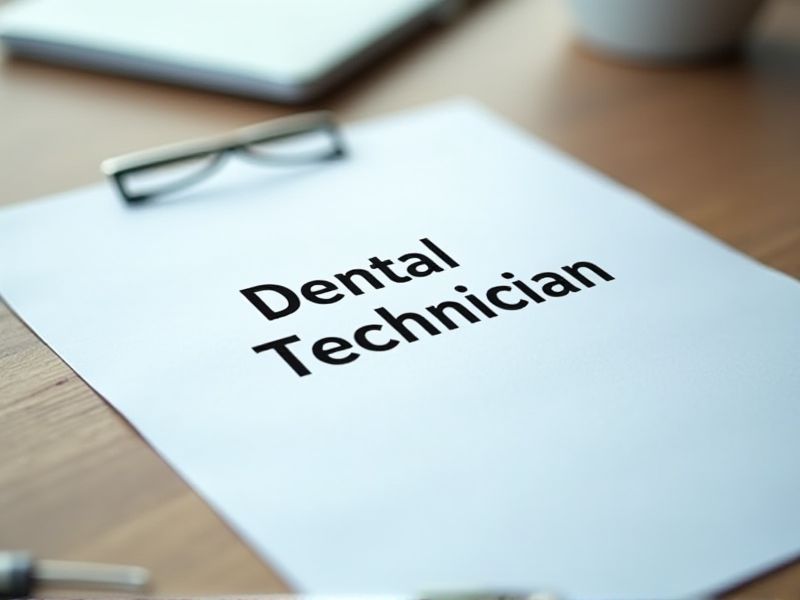
Dental Technicians play a crucial role in the dental industry by creating prosthetics and appliances that ensure proper dental function and aesthetics. Certifications validate their skills and knowledge, ensuring the high-quality production of dental devices in compliance with industry standards. Obtaining certifications can also enhance a technician's credibility, career opportunities, and ability to use advanced dental materials and technologies. Here are some key certifications that are essential for becoming a successful Dental Technician.
Certified Dental Technician (CDT)
A Certified Dental Technician (CDT) ensures that dental restorations meet high industry standards, leading to better patient outcomes. Obtaining CDT certification demonstrates a dental technician's expertise and commitment to continuous education in the field. With a CDT, technicians are recognized for their specialized skills, making them more competitive in the job market. Certification also helps maintain a consistent level of quality across dental labs, enhancing overall trust in dental services.
Certified Dental Ceramist (CDC)
Certified Dental Ceramists (CDC) enhance the precision and quality of dental restorations by using their specialized skills in ceramic materials. Their expertise ensures aesthetically pleasing and functionally effective dental prosthetics, meeting specific patient needs. A CDC's advanced knowledge reduces error rates, leading to longer-lasting dental solutions and increased patient satisfaction. As dental ceramics technology evolves, CDCs provide a critical bridge between dental advancements and practical application in labs.
CAD/CAM Dental Design Certification
CAD/CAM Dental Design Certification ensures dental technicians are proficient in using advanced technology to fabricate precise dental prosthetics. With certified training, technicians can reduce errors, leading to improved patient outcomes and increased trust from dental professionals. Employers value certified technicians for their validated expertise, often leading to better job prospects and career advancement. As digital dentistry continues to evolve, certification helps technicians stay current with industry standards and technological advancements.
Digital Dentistry Certificate
Dental technicians benefit from a Digital Dentistry Certificate as it enhances their understanding of advanced digital tools, improving accuracy and efficiency in dental prosthesis production. With the certificate, they gain competence in operating CAD/CAM systems, which are increasingly becoming the standard in dental labs. Knowledge from the certification allows for better collaboration between technicians and dentists given the technological advancements in dentistry. Holding such certification often leads to increased job opportunities and potential earnings, due to the growing demand for digital skills in the industry.
Dental Implant Technician Certification
Dental Implant Technician Certification ensures that dental technicians possess the necessary skills to fabricate precise and functional dental implants, enhancing patient outcomes. Certified technicians have a competitive edge in the job market, often leading to better career opportunities and increased income potential. Certification signifies a standard of professionalism and commitment to continuous education, fostering trust among dental professionals and patients. As implant technology advances, certified technicians stay updated with the latest materials and techniques, ensuring high-quality implant production.
Infection Control Certification for Dental Laboratories
Infection control certification for dental laboratories is crucial as it reduces the risk of cross-contamination between dental devices and patients. By ensuring strict adherence to hygiene standards, dental technicians can safeguard public health and enhance patient trust. Certified technicians are better equipped to handle and sterilize materials, which minimizes potential infection outbreaks. Professional credibility and compliance with regulatory requirements also increase with proper certification.
Quality Assurance Certification in Dental Laboratory Practice
Quality Assurance Certification in Dental Laboratory Practice ensures dental technicians maintain consistent standards, leading to improved patient outcomes. This certification helps in minimizing errors in dental prosthetics, which directly affects patient comfort and satisfaction. Dental technicians with certification often gain credibility and increase trust with dentists and patients. As a result, certified technicians typically experience better job opportunities and professional growth.
Dental Materials Science Certification
The Dental Materials Science Certification equips dental technicians with crucial knowledge about the properties and applications of various materials used in dental restorations. Understanding these materials ensures precision in fabricating dental appliances, directly influencing patient safety and comfort. This certification also aids in maintaining compliance with industry standards and regulations, mitigating potential legal risks. The enhanced expertise contributes to improved job performance and career advancement opportunities within the dental field.
OSHA Occupational Safety Certification for Healthcare
Dental technicians handle hazardous materials and equipment, so OSHA certification helps ensure they follow safety protocols to minimize risks. Exposure to harmful substances like silica dust and chemicals in a dental lab can pose significant health threats; OSHA training equips technicians with the knowledge to manage these safely. Compliance with OSHA standards reduces workplace accidents, leading to fewer interruptions in dental practices and lower overall costs. Proper safety procedures foster a safer work environment, enhancing the technician's ability to focus on quality dental appliance production.
Continuing Education in Dental Laboratory Technology
Staying updated with advancements in dental technology improves the quality and precision of dental prosthetics. Continuing education enables dental technicians to learn new techniques, enhancing their skill set and job performance. As dental materials and equipment evolve, ongoing training ensures technicians can effectively use modern tools and materials. Adhering to industry standards through continuous education helps maintain professional certifications and credibility.
Summary
When you obtain certifications as a Dental Technician, your skillset becomes recognized, leading to enhanced career opportunities. Employers often prioritize certified technicians, increasing your chances of securing higher positions or salary boosts. Certification also signifies a commitment to professional development, which may improve patient trust and satisfaction. Networking opportunities often arise through certification programs, expanding your professional connections and growth prospects.
